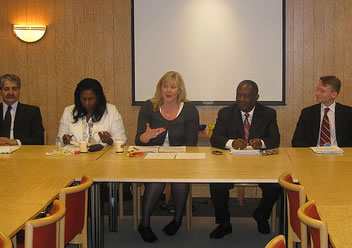
May 8, 2009 | United Nations, New York
On May 8, 2009, PGA organized an initial Strategy Session on the Role of Parliamentarians in addressing the Rights of Persons with Disabilities at the Permanent Mission of Sweden to the United Nations. The session brought together several members from PGA's Executive Committee as well as Representatives from United Nations Agencies, members from the International Disabilities Alliance (IDA) and the New York State Disabilities Advocacy Association & Network (NYSDAAN).
Mr. Harald Fries, Minister for Economic and Social Affairs with the Permanent Mission of Sweden to the UN and Sen. Bassey Ewa-Henshaw (Nigeria) PGA President gave the Welcome Remarks at the opening the session. Ms. Marie Norden, MP (Sweden) and Convenor of the Sustainable Development, Health and Population Program, underscored the importance of the role legislators play in highlighting issues affecting persons living with disabilities into future PGA work. Some areas where changes can make a difference include education, health care and employment.
The agenda reflected voices from a multi-stakeholder perspective as the audience included members of parliament from regions such as Europe, Africa to South Asia. Ms. Kathryn Cappella and Dr. Mariette Bates, representatives from New York State Disabilities Advocacy Association and Network (NYSDAAN), gave a joint presentation of the work they are engaged in from a national and local perspective. Ms. Cappella stated that the work of NYSDAAN was to bring together varied agencies to work toward progress and one goal. She also mentioned the importance of stressing the use of correct language when discussing disabilities as this plays a key role in changing attitudes and perceptions. Dr. Bates furthered the dialogue by discussing the need to address basic issues that persons with disabilities may face and are not often clear-cut for the broader audience (i.e. physical accessibility, health care and education). Dr. Bates mentioned that parliamentarians play a unique role, especially when it comes to looking at the gaps within legislation and raising awareness among the general public.
There were also presentations by representatives from UN Agencies. Ms. Akiko Ito, Chief of the Secretariat for the Convention on the Rights of Persons with Disabilities/UN Focal Point on Disabilities, began by stating that the Convention on the Rights of Persons with Disabilities is a powerful legal tool that aids in addressing this issue. The Convention can be seen as a document that is broader than the traditional human rights as it also considers development and the Millennium Development Goals (MDGs). Ms. Ito noted that statements given by legislators, especially at UN conferences, help to give visibility to the issue, thereby generating a broader dialogue. Another related issue is the inclusion of gender perspectives within the disability area.
Ms. Luz Melo, UNFPA Human Rights Technical Adviser, spoke about the need for legislation guided by the principles of the IPCD (1994). Ms. Melo highlighted that the IPCD was the first international human rights treaty addressing reproductive and sexual health. Persons living with disabilities have been marginalized, especially women. Many have suffered a higher level of physical and sexual abuse and are more vulnerable to sexually transmitted diseases (STIs), forced abortions and sterilizations and prevented from gaining education. UNFPA is working to address these gaps as men and women face different circumstances in terms of facing and dealing with disability.
PGA's Executive Board Member, Mr. Ibrahim Sorie, MP (Sierra Leone) discussed the implications of disability due to conflict. Using Sierra Leone's civil war as an example, Mr. Sorie described the brutalities suffered by the population including debilitating casualties. The government is now working with donor agencies to provide services to re-integrate these individuals so that they can live normal lives. The government has established a trust fund for war victims to provide services such as rehabilitation, reconstruction, trauma healing, prosthetic availability and continuation of services. He also mentioned the government's commitment to passing relevant legislation and to mainstream disability issues.
Members from the International Disabilities Alliance (IDA), Ms. Venus Ilagan and Mr. Morgan Welebir gave a summary of IDA and the work they are involved within this area as well as their role in the Convention (CRPD). One specific point that was mentioned involved the need to re-visit certain legislation to bring it in line with the convention such as Article 12.
The session ended with Dr. Donya Aziz, MP (Pakistan), PGA Executive Board member and Deputy Convenor of SDHP, by giving the closing remarks. Dr. Aziz emphasized that parliamentarians can be opinion leaders and should be engaged with issues such as these early in the discussions. Legislators can play the public role and can appeal to various audience, in both their constituencies and nationally. She also mentioned the importance of bringing into the fold the topic of reproductive health as that too is marginalized many times.
The Strategy Session was organized with kind support by both the Swedish International Development Cooperation Agency (Sida) and United Nations Population Fund (UNFPA).
